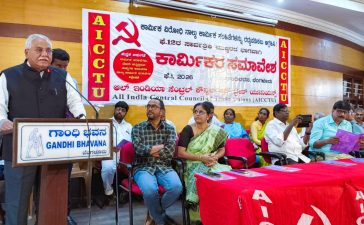Midnight Passage of Wakf Bill Sparks Controversy: Government’s Priorities Questioned
ನಿದ್ದೆ ಬಿಟ್ಟು ಮಧ್ಯರಾತ್ರಿಯಲ್ಲಿ ವಕ್ಫ್ ಬಿಲ್ ಪಾಸ್ ಮಾಡಿ ಕೇಂದ್ರ ಸರ್ಕಾರ ಬೆಟ್ಟ ಅಗೆದು ಇಲಿ ಹಿಡಿದಿದೆ..
✍️
By Mushtaq Hennabail
A Midnight Move: The Wakf Bill Controversy
In a surprising move, the central government passed the Wakf Bill in a midnight session, drawing criticism from various quarters. Detractors argue that while pressing national issues remain unresolved, the government has expended its energy on a bill that has little direct impact on the everyday struggles of common citizens. Critics liken the move to “digging a mountain to catch a rat.”
Ailing Healthcare and Economic Struggles
India’s healthcare sector continues to be plagued by inefficiencies, leaving quality medical services inaccessible to the underprivileged. State-of-the-art hospitals cater primarily to the wealthy, while government healthcare schemes are marred by bureaucracy and inefficacy. “Even if one person benefits from these schemes, a hundred others are left waiting,” critics argue, highlighting the scheme’s limited reach.
Beyond healthcare, economic disparity remains a significant concern. Unemployment rates are soaring, and social disparities in education—where the rich have access to English-language instruction while the poor are confined to regional languages—continue to widen the gap between different economic classes. “Half of the country’s population is struggling to find work, yet little is being done to address this growing crisis,” say experts.
Rising Crime and Social Instability
Crime rates, including incidents of violence, assault, and fraud, are reportedly on the rise, affecting thousands daily. The widening economic and educational gap has led to an increase in social unrest. “Young men are finding it difficult to marry due to financial instability, and rising crime rates have made life increasingly unsafe for women,” analysts point out. Senior citizens, meanwhile, face neglect, with many being left to spend their twilight years in old-age homes.
Corruption in Local Governance
The inefficiencies in local governance further exacerbate these issues. Panchayat-level corruption, from water supply to housing permits, is rampant. “Citizens are forced to shed tears in government offices, where their pleas often go unheard,” says one affected resident. Meanwhile, access to essential services such as drinking water and housing remains a challenge for nearly half the population.
Moral and Social Decay
Critics also highlight concerns over the growing influence of Western cultural norms, citing the rise of drug abuse, live-in relationships, and family instability as threats to India’s social fabric. “The lack of a well-structured education policy has led to a society where values are eroding,” they lament. India also reportedly has one of the highest suicide rates globally, and mental health concerns are mounting at an alarming rate.
The Wakf Bill: A Political Strategy?
While fundamental issues remain unresolved, the government has prioritized the passage of the Wakf Bill, which has sparked controversy over its implications. Critics allege that the bill is designed to polarize communities rather than serve any practical purpose. The government, they argue, has misrepresented facts about Wakf properties and created an atmosphere of mistrust. “The claim that Wakf is the third-largest landholder in the country is a blatant exaggeration,” say legal experts.
Further, allegations that any land claimed by Muslims automatically becomes Wakf property have added to the tensions. “The narrative that an entire village in Tamil Nadu, including a 1,500-year-old temple, is under Wakf control is yet another misinformation campaign aimed at creating division,” experts contend.
A Political Gamble for Votes?
Many believe the government is strategically using the Wakf issue to appeal to certain voter bases. “This is nothing more than an election stunt,” say political analysts. “While politicians themselves maintain business and personal ties with Muslim communities, their public stance is dictated by electoral calculations.”
The Larger Question: Are Real Issues Being Ignored?
While the nation grapples with pressing concerns—ranging from economic disparity to education and healthcare—the government’s focus on polarizing legislation raises questions about its priorities. Critics argue that the same effort and urgency should be applied to addressing citizens’ everyday struggles. “If only this energy were spent on uplifting the poor rather than passing bills in the dead of night, many lives could have been improved,” they conclude.
Short Summary:
The central government’s decision to pass the Wakf Bill in a midnight session has drawn widespread criticism. Detractors argue that while pressing national issues—such as unemployment, healthcare, education, and crime—remain unresolved, the government has prioritized a bill that has little impact on everyday struggles. Allegations of misinformation about Wakf properties have further fueled controversy, leading many to believe that the bill is being used as a political tool for voter appeasement rather than genuine reform.
Context & Background:
-
Wakf properties refer to lands or assets donated for religious or charitable Muslim causes, managed by Wakf boards.
-
The government’s move to amend Wakf-related regulations has sparked concerns about land disputes and community tensions.
-
Critics argue that the bill is an attempt to polarize public sentiment rather than address urgent economic and social challenges.
-
Misinformation surrounding Wakf land holdings has led to fear-mongering among different communities.
Key Statements & Quotes:
🔹 “If only this urgency was applied to fixing healthcare, unemployment, and education, countless lives would have been improved.” – Social Activist
🔹 “Passing a bill at midnight instead of focusing on the nation’s real problems is nothing short of a political stunt.” – Opposition Leader
🔹 “The claim that Wakf is the third-largest landholder in India is a myth created to incite divisions.” – Legal Expert
🔹 “Citizens are struggling with inflation and joblessness, yet the government chooses to play politics over religious issues.” – Political Analyst
Q & A Section:
Q: Why is the Wakf Bill controversial?
A: The bill has raised concerns over land ownership disputes, potential misinformation, and the timing of its passage—done at midnight instead of focusing on urgent national issues.
Q: What are the main criticisms against the government regarding this bill?
A: Critics argue that the government is using the bill as a political distraction while ignoring major challenges like unemployment, rising crime, and failing healthcare.
Q: Is there misinformation about Wakf properties?
A: Yes. Some claims, such as “all land claimed by Muslims becomes Wakf property”, have been dismissed as exaggerated narratives meant to stir community tensions.
#WakfBill #IndiaPolitics #MidnightLegislation #PublicConcerns #LandDisputes #PoliticalStrategy #UnemploymentCrisis #EducationForAll #RealIssuesIgnored #FactVsMyth
![]()











